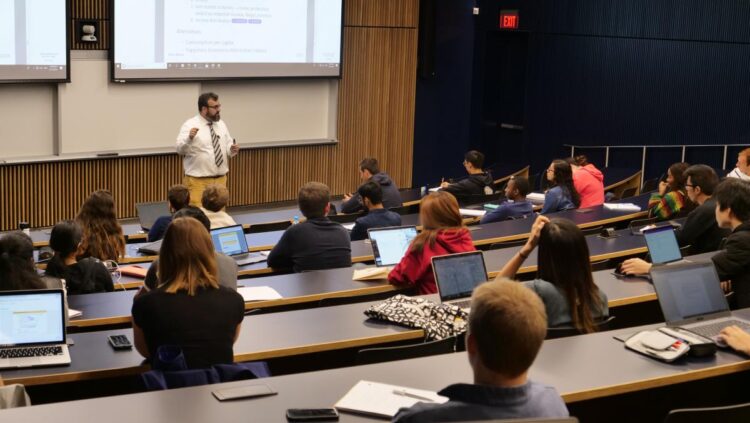Mathematics is often regarded as a universal language that transcends the boundaries of disciplines. It forms the foundation of scientific inquiry, technological innovation, and economic analysis. Consequently, mathematics plays a pivotal role in various college majors, albeit to differing degrees and applications.
In this article, we’ll embark on a journey through different college majors and explore the diverse ways in which math serves as an indispensable tool and framework for understanding and solving complex problems.
Page Contents
Mathematics as a Core Competency

Source: unsplash.com
Before diving into specific college majors, it’s crucial to acknowledge the universal role of mathematics in education. Almost all college students, regardless of their major, are required to complete some level of math coursework as part of their general education requirements. These math courses are designed to equip students with foundational mathematical skills and foster critical thinking, problem-solving, and analytical abilities.
For students seeking additional support and resources to excel in their math coursework, platforms like math-master.org can be valuable tools in honing these essential mathematical skills and enhancing their overall college experience.
STEM Majors
a. Engineering
Engineering is one of the most math-intensive college majors. Whether it’s civil, electrical, mechanical, or aerospace engineering, mathematics is at the core of every engineering discipline. Differential equations, calculus, linear algebra, and probability theory are just a few of the mathematical concepts engineers routinely apply to design and analyze structures, systems, and processes.
b. Physics
Physics explores the fundamental laws that govern the universe. Math is the language physicists use to express these laws. Complex mathematical equations, such as those found in quantum mechanics or general relativity, are essential tools for understanding the behavior of particles, waves, and celestial bodies.
c. Computer Science
Computer science majors rely heavily on mathematical logic and discrete mathematics to design algorithms, analyze data structures, and develop software. Math is the bedrock upon which computer science principles are built, enabling the creation of efficient and robust software solutions.
d. Mathematics and Statistics
The math major itself is an obvious example of a field where mathematics is paramount. Mathematicians explore abstract concepts, develop proofs, and apply mathematical principles across various domains. Statistics, closely related to mathematics, plays a pivotal role in fields like data science, finance, and social sciences.
Business and Economics

Source: economics.sas.upenn.edu
a. Finance
Finance majors use mathematics extensively to model financial markets, assess risk, and make investment decisions. Concepts like calculus and probability theory are integral to pricing financial derivatives and managing portfolios effectively.
b. Economics
Economics relies on mathematical models to analyze economic phenomena and make predictions. Tools such as differential equations, game theory, and econometrics are indispensable for understanding and influencing economic systems.
Social Sciences
a. Psychology
Statistical analysis is a fundamental component of psychological research. Psychologists use math to design experiments, analyze data, and draw conclusions about human behavior and cognition.
b. Sociology
Sociologists employ statistical methods to examine patterns in human society and behavior. Math is essential for analyzing survey data, conducting social research, and understanding social phenomena.
Health and Life Sciences

Source: mooc.org
a. Biology
Biology, particularly in the field of genetics and bioinformatics, relies on mathematics for data analysis and modeling. Mathematical tools are used to interpret genetic sequences, study population genetics, and simulate biological processes.
b. Medicine
Medical professionals, including doctors and researchers, use statistics and probability to assess the efficacy of treatments, analyze clinical trials, and make informed medical decisions. Understanding medical statistics is crucial for evidence-based medicine.
Humanities and Arts
a. Architecture
Architects use geometry, trigonometry, and calculus to design buildings that are not only aesthetically pleasing but also structurally sound. Math is integral to architectural planning and construction.
b. Music
Music theory, a field within music education and composition, involves mathematical concepts like ratios, frequencies, and patterns. Musicians use math to create harmonious compositions and understand the mathematical underpinnings of musical scales and chords.
Environmental Sciences

Source: careermatch.com
Environmental scientists use mathematical models to study climate change, ecosystems, and environmental phenomena. Calculus and differential equations are applied to predict the impact of environmental factors on the planet.
Education
Even in the field of education, math plays a role. Educators use math to analyze student performance data, design curriculum, and develop effective teaching strategies. Understanding math helps educators assess and improve the quality of education they provide.
Conclusion
Mathematics is a thread that weaves through the fabric of college education, connecting diverse disciplines and enabling a deeper understanding of the world. It serves as a tool for problem-solving, critical thinking, and quantitative analysis in fields as varied as engineering, business, social sciences, health, humanities, and the arts.
While the extent of mathematical involvement may vary from one major to another, the skills acquired through math education are universally applicable. They empower students to think logically, make informed decisions, and adapt to the ever-evolving demands of the modern workforce.
Thus, math’s role in different college majors is not just functional but transformative, shaping individuals into analytical thinkers equipped to tackle complex challenges in their chosen fields. Check out our article explaining how to get better grades in college.





